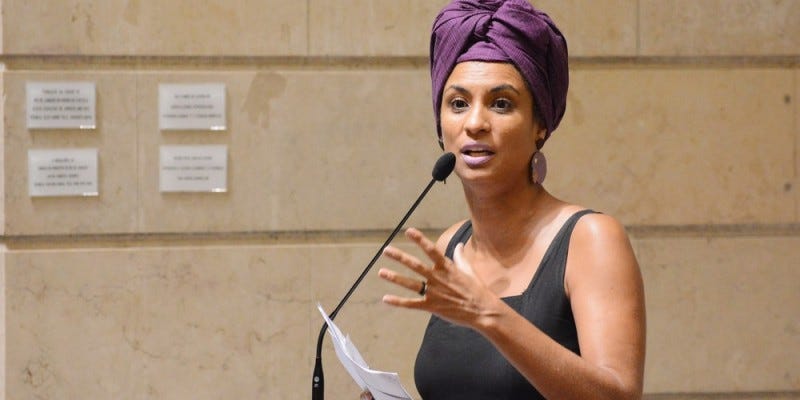TLDR
Crazy that just this year Marielle Franco was murdered for defending the rights of Black women in Brazil. THIS racist is close to becoming the next President of Brazil. Which makes up 47-50% of Afro-Brazilians if you count Mulattoes.
- Jair Bolsonaro is the Trump of Brazil, but worse
- Married 3 times and has 5 children
- OPPOSES reparations for Black Brazilians. 'They don't deserve a dime". His words
- Is close to winning the Presidency in Brazil. Elections are held next month (October) on the 7th.
- Women should NOT receive equal pay because they are women and get pregnant.
- Made Pro-Rape comments
- Homophobic. "Gays should be beaten".
- HUGE Donald Trump supporter and calls him and inspiration.
- HUGE social media following

National Social Liberal Party presidential candidate Jair Bolsonaro greets people as he campaigns at Madureira market in Rio de Janeiro, Brazil, Monday, Aug. 27, 2018. Brazil will hold general elections on Oct. 7. (AP Photo/Silvia Izquierdo)
Brazil, is having a presidential election this fall. It’s beginning to look a lot like the one North America’s largest and most powerful country had two years ago.
Not counting the currently imprisoned former president, Luiz Inacio “Lula” da Silva, the leading candidate is Jair Bolsonaro. He reminds many of Donald Trump. Both are blunt-spoken, and Mr. Bolsonaro describes his opponents in colorful, harsh language.
He also emphasizes his support of traditional family values and plays to the nostalgia of older voters who remember two decades of military dictatorship (1964-1985) as a time of “law and order” and a booming economy.
Those days are gone. Brazil is on track to exceed the record 63,000+ murders recorded last year. Martial law has been imposed in Rio de Janeiro to contain its notoriously lethal gangs. Mr. Bolsonaro promises tougher law enforcement — and allowing ordinary citizens to arm themselves.
Gabriel Arruda of the Monte Castelo Institute, a center-right think tank in Brasilia, notes that Brazilian voters say they are fed up with crime and corruption, and want somebody who won’t forget about them once they’re elected. This, too, mirrors U.S. voter sentiment in 2016.
A decade of corruption scandals produced political chaos in Brazil. Kickbacks, graft, and cronyism at big state-owned companies such as the oil giant Petrobras and private concerns such as the mammoth Odebrecht conglomerate have left many Brazilians disgusted with their elites.
“Lula,” the longtime head of the socialist Workers’ Party, has been sentenced to 12 years imprisonment for money-laundering and corruption and faces multiple additional charges as well.
His protege and successor, former President Dilma Rousseff, was impeached and removed from office in 2016 for budgetary misconduct. Her successor, market-oriented centrist Michel Temer, has also been tarnished by corruption accusations.
Lula’s core support of 30 percent of Brazilians — mostly poor and low-skilled voters in the north — would vote for him no matter what, but the rest of the country has no desire to return to the corruption of the Lula/Dilma era.
They also resent Brazil’s huge and enormously expensive bureaucracies at all levels of government — national, state, and local.
Yet many Brazilian conservatives and libertarians are wary of Mr. Bolsonaro, a nationalistic military man unschooled in economics. They fear he might return to the statist, populist, government-centric economic policies of the dictatorship years. To allay those fears, Mr. Bolsonaro points to Paulo Guedes, a free-market economist and investment banker who would be his finance/economy minister and is on record urging privatization of all state-owned enterprises.
Whoever wins the election will face tremendous challenges. As the Heritage Foundation’s Index of Economic Freedom reports, Brazil’s economy is burdened by a bloated federal government (and inefficient state-level governments), oppressive regulation, heavy taxes, fiscal deficits, high government indebtedness, and labor-market rigidities.
Brazil must undertake fundamental reforms, not just to achieve the long-term growth associated with increasing economic freedom, but also to break the destructive “boom-or-bust” pattern that has emerged in the recent years of crisis-mode governance.
For decades many pundits have said that “Brazil is the country of the future, and always will be.” For a few years in the 1990s, it appeared that Brazil might escape its fate through the courageous reforms implemented by the centrist former President Henrique Cardoso. Tragically, the fiscal stability Mr. Cardoso achieved was squandered during the Lula/Dilma years while the country enjoyed the commodity boom.
There is little hope, however, that the Worker’s Party, either through Lula or through the candidacy of former Sao Paolo Mayor Fernando Haddad, would do things differently if they got back into power. The very prospect of Lula’s party returning to the presidency sent Brazilian stock and currency markets reeling last month.
The big question regarding Mr. Bolsonaro is not whether, if given the chance, he can make Brazil “great again.” It is whether he can implement the tough reforms Brazil needs to realize the great potential it has always possessed.
Will Jair Bolsonaro Make Brazil Great? Again?
Crazy that just this year Marielle Franco was murdered for defending the rights of Black women in Brazil. THIS racist is close to becoming the next President of Brazil. Which makes up 47-50% of Afro-Brazilians if you count Mulattoes.





